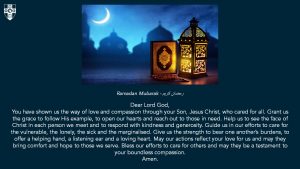As we enter the sacred month of Ramadan, it’s a time for Muslims worldwide to deepen their connection with Allah through fasting, prayer and reflection. However, the significance of Ramadan extends beyond the boundaries of Islam. For us as Catholics, the values and practices observes during this holy month resonate deeply with our own spiritual traditions.
Fasting holds a central place in both Catholicism and Islam. In the Catholic faith, fasting is often associated with the holy season of Lent, a period of self-examination and preparation leading up to Easter. Similarly, during Ramadan, Muslims abstain from food, drink and other physical needs from dawn until sunset, not only as an act of obedience but also as a means of purifying the soul and drawing closer to God.
The act of fasting serves as a powerful reminder of the blessings we often take for granted. It heightens our awareness of the needs of others and fosters a sense of solidarity with the less fortunate. In both traditions, fasting is not merely about abstaining from food but also about cultivating compassion, empathy and generosity towards those in need.
Moreover, Ramadan and Lent both emphasise the importance of spiritual renewal and self-discipline. They provide opportunities for believers to break free from the distractions of everyday life and focus on nurturing their relationship with the divine. Through prayer, meditation and acts of charity, Catholics and Muslims alike seek to purify their hearts and minds, striving for greater closeness to God.
During Ramadan, Muslims engage in increased acts if worship, such as reciting the Quran, attending nightly prayers (Taraweeh), and seeking forgiveness for past wrongs. Similarly, during Lent, Catholics dedicate themselves to prayer and contemplation, attending Mass more frequently, participating in the Stations of the Cross and seeking the sacrament of reconciliation.
Despite theological differences, there is much that we, as Catholics, can learn from the spiritual practices of Ramadan. The discipline of fasting teaches us the value of self-control and the importance of detaching from material comforts. It reminds us that true fulfillment comes not from worldly possessions but from our relationship with God and our service to others.
Additionally, the spirit of community and solidarity that pervades Ramadan is something that we can emulate. Breaking the fast (Iftar) with family and friends, reaching out to neighbours in need, and supporting charitable causes are all acts that strengthen the bonds of fellowship and demonstrate love for our fellow human beings.
As we journey through the month of Ramadan, let us, as Catholics, pause to reflect on the shared values and aspirations that unite us with our Muslim brothers and sisters. Let us use this time to deepen our own spiritual practices, to grow in compassion and understanding, and to draw closer to the source of all grace and mercy.
In the spirit of Ramadan, may we all strive for greater humility, generosity and love, and may our collective efforts contribute to a world where peace, justice and harmony reign supreme.
Ramadan Mubarak!


